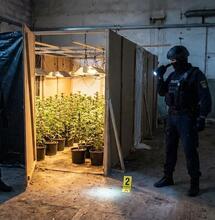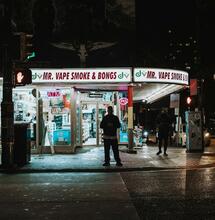New York Grants First Batch of Growing Licenses
.jpg)
State regulators approve a total of 52 licenses, allowing hemp farmers to grow marijuana for the upcoming adult market. This is the first round of permits authorized by New York officials. Governor Hochul's administration recently also introduced other regulatory changes in preparation for the official market launch later this year.
New York's Cannabis Control Board approved the licenses under a recent law that allows hemp growers to cultivate marijuana for the legal recreational market for two years.
State regulators voted Thursday, April 14, to grant so-called conditional marijuana cultivation licenses to hemp businesses as one of the first steps towards ensuring an adequate supply of cannabis as the state prepares to officially launch adult-use retail later this year.
The granting of licenses will enable farmers to benefit from this year's growing season and harvest in October, said Allan Gandelman, a Cortland-based hemp grower who received one of the licenses and is also the president of the New York Cannabis Growers and Processors Association.
"We have a narrow window here. Most people are planting cannabis in our area around May and June. So we're pretty much there," Gandelman said.
Under New York regulations, farmers can cultivate crops over a one-acre area (0.4 hectares), which is little more than half the space in a greenhouse. Farmers can also split between outdoor and greenhouse grows.
Gov. Kathy Hochul said the cultivation licenses would help "jump-start" what's projected to become one of the biggest legal pot markets in the U.S.
New York legalized the recreational use of marijuana in March 2021. While the law immediately allowed New Yorkers to smoke pot freely, statewide retail sales are still due to commence. Official sales are expected to launch by the end of the year and get into full swing by spring next year.
"New York's farms have been the backbone of our state's economy since before the American Revolution, and now, New York's farms will be at the center of the most equitable cannabis industry in the nation," Hochul said in a press release statement.
She added: "I'm proud to announce the first adult-use cannabis cultivation licenses in the state, and I'm proud of the work the Office of Cannabis Management and the Cannabis Control Board are doing to get adult-use cannabis sales up and running as fast as possible without compromising our mission to uplift communities and individuals most impacted by the past century of cannabis prohibition."
In addition, New York regulators advanced a rule last month to prioritize individuals and families who have been affected by convictions and past marijuana laws. The first round of adult-use marijuana retailer licenses will be granted to this group of applicants before proceeding with existing medical cannabis businesses.
The licensing development is part of what the Hochul administration calls the "Seeding Opportunity Initiative," which she also announced last month.
Office of Cannabis Management (OCM) Executive Director Chris Alexander said that he expects around 200 "justice-involved" applicants to receive the priority licenses under the proposal. However, a recent poll found that most New Yorkers are against this measure.
New York's social equity program
With a projected value of over $2 billion, New York's marijuana market is expected to see a full launch by the spring of 2023. Half of all adult-use licenses are planned for social and economic equity applicants. The state will also allocate 40% of the tax revenue to community investment funds.
By many merits, New York appears to be building a golden standard social equity program. Under the program, social equity participants are subject to low or zero-interest loans and reduced or waived fees. State regulators are also bound to provide training for people of color, women, veterans of war, and others who qualify as social equity applicants.
Existing medical marijuana operators can convert up to three medical dispensaries into hybrid shops, given that they settle a one-time "special-licensing fee." The money from those fees will be allocated for funding social equity grants.
Last but not least, those who obtain social equity licenses are not allowed to sell or pass possession of their licenses within the first three years of business.













